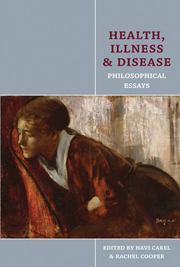Book contents
- Frontmatter
- Contents
- Acknowledgements
- Contributors
- Introduction
- Part I Concepts of health and disease
- Part II The experience of illness
- 5 What is phenomenology of medicine? Embodiment, illness and being-in-the-world
- 6 Beyond the wounded storyteller: rethinking narrativity, illness and embodied self-experience
- 7 Transitions in health and illness: realist and phenomenological accounts of adjustment to cancer
- 8 Pain as illness
- Part III Illness and society
- Bibliography
- Index
5 - What is phenomenology of medicine? Embodiment, illness and being-in-the-world
from Part II - The experience of illness
- Frontmatter
- Contents
- Acknowledgements
- Contributors
- Introduction
- Part I Concepts of health and disease
- Part II The experience of illness
- 5 What is phenomenology of medicine? Embodiment, illness and being-in-the-world
- 6 Beyond the wounded storyteller: rethinking narrativity, illness and embodied self-experience
- 7 Transitions in health and illness: realist and phenomenological accounts of adjustment to cancer
- 8 Pain as illness
- Part III Illness and society
- Bibliography
- Index
Summary
The question of my chapter's title involves two issues that have to be settled before moving on to the main topic, the phenomenology of medicine: the issue of what phenomenology itself might be, certainly, and I will return to that shortly; but no less important, the issue of what medicine is.
MEDICINE
So, what is medicine? What is its essence and how are its borders with other human activities to be delineated? As everyone who has pursued the field of philosophy of medicine knows, the exact nature and border of medicine is itself a constant topic of debate. I myself would defend a concept of medicine that stresses the meeting of health care professional and patient in an interpretative attempt to help and treat the ill and suffering one, whereas others would look rather for the essence of medicine in the application of medical knowledge in attempts to understand and alter the biological organism (Svenaeus 2000b). These two answers to the question of what medicine is do not necessarily exclude each other; they could be brought into dialogue, and the first answer could be made to include the second, just as the second answer could be complemented by the first. The interpretative practice of understanding and helping the patient could, and, indeed, should, include biological knowledge, while the applied biology paradigm would need to address, in some way, that the doctor sees a person and not only the person's body.
- Type
- Chapter
- Information
- Health, Illness and DiseasePhilosophical Essays, pp. 97 - 112Publisher: Acumen PublishingPrint publication year: 2012

